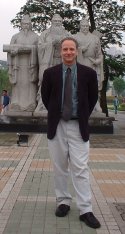Exporting Higher Education: Promising Pedagogy
From the US perspective, Transnational Education is limited by problematic pedagogy. By releasing online course material for free to world,
MIT has clearly registered its opinion on entirely asynchronous independent study. There is value in it, the university is implicitly stating through its actions, or else why spend millions making the material available? But it is not the experience that an MIT degree represents. So much for Mode 1(
Cross Border Supply), in and of itself.
The most obvious forms of
Commercial Presence also present problems, as noted above. Local stand-ins, no matter how qualified, are not faculty members of the degree granting institution. To an American educator, outsourcing the delivery of lesson plans and overall course curriculum feels like a strategy motivated solely by monetary gain. To an Asian student raised in an exam-based educational culture, the model does not feel strange at all. In fact, the local stand-in may be better qualified to deliver the course content than a foreign faculty member steeped in a different set of assumptions about teaching and learning.
Nevertheless, American universities are committed to an educational policy of interaction and engagement. As the
MIT example shows, the meaning of a university's degree lies in the multidimensional experience of being physically present in its learning environment, in the interactions that take place, not simply with course content – but with faculty, other students, and the university itself. As an instructional technologist, I might like to believe that videoconferencing and virtual classrooms could duplicate that experience, but I know that they cannot. The right technology, however, in conjunction with several non-traditional uses of faculty may produce not a duplicate, but a rich and engaging learning environment of a very different nature.
. . .

